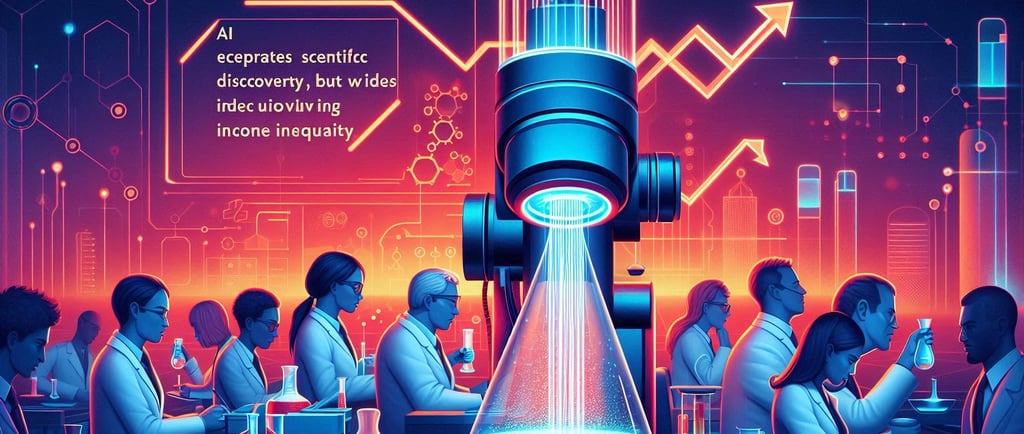Exploring the Impact of AI on Scientific Discovery and Income Inequality
Recent research by Aidan Toner-Rodgers at MIT shows that AI can significantly accelerate scientific discovery, leading to more materials discovered, increased patent filings, and new product prototypes. However, the benefits of AI are not evenly distributed, with top scientists seeing a substantial increase in productivity while others experience little improvement. This disparity could exacerbate income inequality, and many scientists report reduced job satisfaction due to the loss of the creative aspect of their work.
USAGEFUTUREWORK
The AI Maker
4/3/20252 min read


Artificial intelligence (AI) has been a topic of much debate among economists and researchers. While some believe it will exacerbate income inequality and have minimal impact on productivity, others are more optimistic about its potential benefits. Recent research by Aidan Toner-Rodgers, a doctoral student at the Massachusetts Institute of Technology (MIT), offers new insights into this ongoing debate.
Toner-Rodgers's study examines the real-world impact of AI on scientific discovery. His research involved the randomized introduction of an AI tool to 1,018 scientists at a materials-science research lab. The results were striking: after implementing the AI tool, researchers discovered 44% more materials, their patent filings increased by 39%, and there was a 17% rise in new product prototypes. This suggests that AI can significantly accelerate the discovery process, making it shorter and less expensive.
The study also highlights the potential for AI to drive scientific innovation. AI tools trained on the structure of existing materials can generate recipes for new compounds based on specified characteristics. This capability could lead to significant advancements in various fields, as new inventions often result in unexpected developments down the line. For example, the gasoline-powered internal combustion engine, initially developed for automobiles, transformed farming when used in tractors, leading to a fourfold increase in agricultural output between 1930 and 1960.
However, the impact of AI is not uniformly positive. Toner-Rodgers found that researchers who were already successful at discovering compounds became even more successful with the AI tool, while others did not benefit as much. This disparity could lead to increased income inequality, as compensation is often tied to productivity. The top scientists, who were better at identifying promising AI-generated recipes, saw an 81% increase in their scientific output. In contrast, those in the bottom third experienced little improvement, spending much time evaluating compounds that did not work out.
Despite these concerns, some experts remain hopeful. David Autor, a colleague of Toner-Rodgers, believes that with proper training, AI could reduce income inequality. For instance, a well-trained paralegal with AI could perform many tasks currently handled by experienced lawyers, potentially earning higher wages. However, without adequate training, workers may struggle to adapt to AI, leading to frustration and dissatisfaction.
Interestingly, the scientists in Toner-Rodgers's study reported reduced job satisfaction after using the AI tool. Many felt that the tool took away the creative aspect of their work, which they enjoyed the most. This highlights a potential downside of AI: while it can enhance productivity, it may also diminish the satisfaction derived from the creative process.
In conclusion, Toner-Rodgers's research provides valuable insights into the potential benefits and drawbacks of AI in scientific discovery. While AI can accelerate innovation and productivity, it also has the potential to widen income disparities and reduce job satisfaction. As AI continues to evolve, it will be crucial to address these challenges to ensure that its benefits are broadly shared.
Cited: https://www.wsj.com/economy/will-ai-help-hurt-workers-income-productivity-5928a389
Your Data, Your Insights
Unlock the power of your data effortlessly. Update it continuously. Automatically.
Answers
Sign up NOW
info at aimaker.com
© 2024. All rights reserved. Terms and Conditions | Privacy Policy
